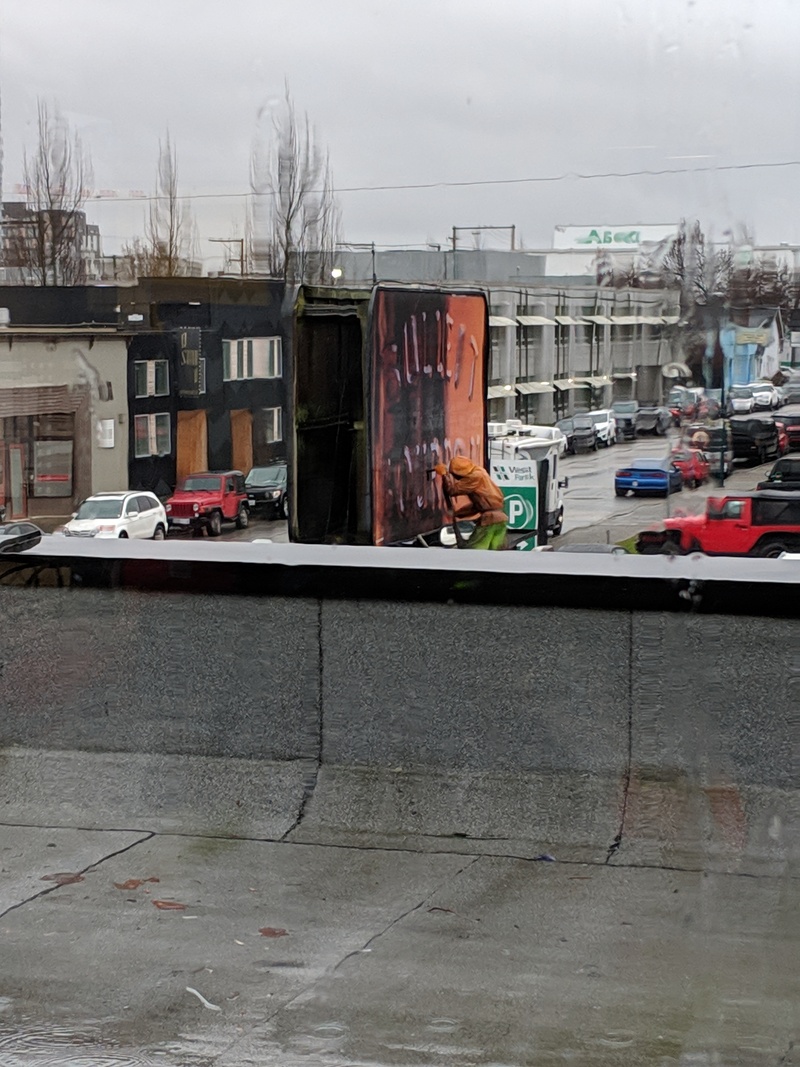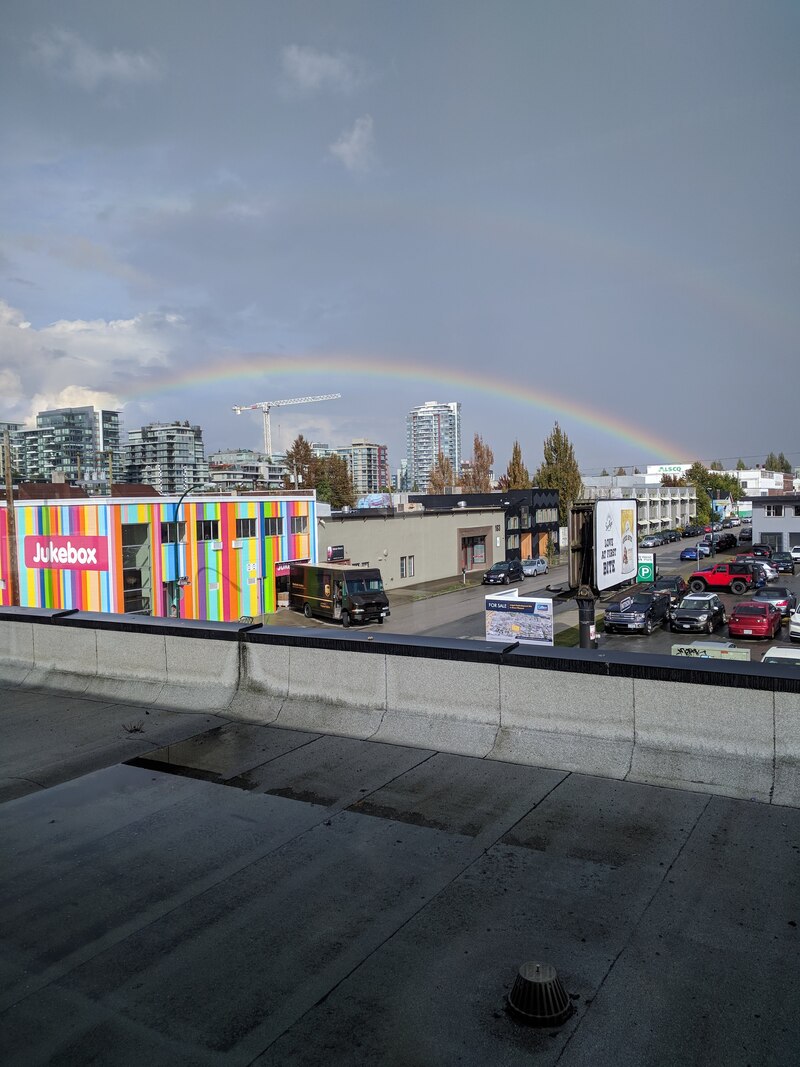2021 Bell Let's Talk Day
Today is Bell Let’s Talk Day. I’ve seen it more in the last few years, but it’s taken a while for me to really understand what its purpose is and what “mental health” means. After weathering at least three depressive episodes, I finally feel like I am on solid ground again. I find we are afraid to share what we have learned and be vulnerable. Our collective fear of sharing perpetuates a stigma that sharing negative personal experiences is not acceptable. Today I am talking and I encourage you to do the same.
Quick Note About Photos
The photos included in this post were taken over the course of two years. They are presented in the order that I took them and its uncanny how each one represents how I was doing mentally during that time.
I can’t find the first one I took, but it was the same Bulleit Bourbon billboard as seen below. It was slowly falling apart and I watched it deteriorate over the course of several months of rain and wind. Staring out the window was my escape, and I formed a strange attachment with this billboard. Almost like it was trying to tell me something.
Stuck in the Weeds
 Maybe alcohol will numb the pain?
Maybe alcohol will numb the pain?
Vancouver winters can be tough. It’s hard to know when it’s grey because it’s raining or if it’s grey because you’re no longer able to see the color in the world.
I injured my knee one day while on a run. The next day I woke up and almost fell down the stairs because of excruciating pain when descending steps. After a week the severe pain disappeared, but would return within minutes of running or jogging. I started going to physio and cancelled any recreational sports I was a part of hoping to let it recover.
Unfortunately, it never did. Instead I’m met with a dull aching sensation at nearly all hours of the day. This pain gets worse when sit for long periods of times. As a programmer, that tends to be a significant portion of my day. If that wasn’t bad enough, it also gets worse as the day passes. By the time night time approaches, you can usually find me pacing or stretching to gain some relief.
Trying to sleep when your knee is screaming at you is no easy task. I dreaded bed time. How long would I be laying there waiting to fall asleep? It started taking me so long to fall asleep, that I’d push back when I woke up to catch up on the hour(s?) I lost trying to fall asleep.
Unconsciously, I started drinking more coffee to compensate for this reduced wakefulness. In the mornings this was great. I had energy, could focus, and no pain. But afternoons led to a monster crash, my pain seemed to get worse, and my ability to fall asleep got even worse.
Me: “Ok Google, I have chronic pain and a sleeping problem, what should I do?”
Google: “Smoke some weed”
The first month or so was incredible. Smoking weed relieved the knee pain, made it easier to fall asleep, and just overall seems to have made things better. I was hooked.
Recently legalized here in Canada, we are many decades behind on education and research that we should have been doing. If someone told you they drank and got drunk every night, very few would hesitate to label this a drinking problem. However, we’re in a strange world where getting high every night is somehow not a smoking problem. “Weed isn’t addictive” is the common retort.
I absolutely became dependent on weed to get me through the night. I don’t think nightly is inherently a terrible thing, but being completely oblivious to that fact is concerning. If you can’t remember the last time your weren’t high or are primarily looking forward to your next one, it’s maybe time to start being aware of it.
The honeymoon phase slowly started wearing off as I found myself significantly more anxious about everything. When I walked around I was worried if I had enough money to make it through the month (hint: I most definitely did). I was worried that every coding change I made would result in catastrophic failure. When something inevitably did fail I spent an hour crying on the couch like I had been diagnosed with terminal cancer.
I became less able to handle social situations and slowly withdrew from the people I knew. I stopped communicating with friends and family as I was incapable of handling a conversation while high. In fairness, a lot of this is due to the stigma around smoking weed, that also should be banished.
The pain, caffeine, weed, anxiety, and stress continued to build up inside of me. I lost the ability to manage my emotions. In some cases just stopped speaking to people, in others completely pushed people away. If you are one of those people, I’m sorry.
Maybe it’s Time for a Change
 My name’s Blurryface and I care what you think
My name’s Blurryface and I care what you think
The mental fog rolled in slowly. So slowly that you I didn’t realize that anything changed. Technically I was meeting whatever requirements existed of me. But really I was doing the bare minimum. I had no idea what I was doing or where I was going.
The billboard changed to a Bell Let’s Talk advertisement one day. I don’t think I consciously realized it, but it definitely triggered me realizing that I needed to talk about everything that I was going through. I didn’t know what was going on or how to even do it.
One day I had my parents over for dinner and I’m pretty sure I just started crying. Slowly I started actually talking to them. None of this “how’s the weather over there?” stuff. They have known me my entire life and are the only people I can trust have my best interests in mind. I no longer knew myself, so I needed someone to help remind me.
This was a start, but it still took months from this point. I went to see a psychologist. I got prescribed anti-depressants and started taking them. After a difficult first few days cycling on to anti-depressants (they can initially make you feel worse), I started waking up not feeling terrible. My knee pain also improved. I still struggled to make it out of bed in the morning, but it was doable (I called in sick a few times for lack of ability).
By some measures I was doing better. But I knew I lost a piece of my soul in the process. My head felt like it was floating as I walked. When I drove, it was like some other being was driving and I was just watching. I remember realizing that I didn’t care if I got in a car accident. Not in a self-harm way, but more in a realizing that I was completely numb.
Co-workers commented that I seemed different. I felt it too, but what does one say in that scenario? “Adam’s not home right now, please try again later.”
I cycled on and off anti-depressants a couple of times. Each time I came off I felt worse than I had at the start.
The psychologist I was seeing was not directly helpful, though I’m sure subconsciously having someone to talk to forced me to work my way through things in my mind regularly.
I knew I didn’t want to be this way forever so I sat down and crafted a plan to escape. I was unable to have things together enough to grocery shop and plan meals, so I decided I would just eat out consistently. That choice afforded me the extra time I needed to go to the gym every day after work. I spent an hour each day sweating out how I was feeling.
There were several other ups and downs along the way, but I had somewhat regained control of how I wanted to run my life.
Proper Prior Planning Prevents Poor Performance
 All of the colors start to return
All of the colors start to return
“Proper Prior Planning Prevents Poor Performance” - this is the mantra instilled in me by an old high school teacher. At the time I just enjoyed the alliteration, which helped it successfully burn its way into my memory.
Prior to university, my schedule (outside of school) was pretty much dictated by extra-curricular activities. This kept me busy enough and whatever spare time I had outside of that was likely spent playing video games.
University was similar in certain ways, but I felt more in control over what activities I engaged in. Between classes, residence advising, recreational sports, and internships I hand my hands full. My calendar was usually booked to the brim from 8AM to 9PM. Small 1 hour windows between classes were slotted for completing assignments. Weekends were usually used to chip away at semester long projects. I enjoyed all of this and didn’t really make time to sit down and process everything that was happening.
At some point in that process, I crafted a plan to work at Electronic Arts. In my eyes they were the coolest and biggest tech company in Vancouver. After no response my first year of applying, I beefed up my resume, built my own video game, and got a job offer the next round of applications.
About a year passed before I started itching for something else. I had learned a lot, but the days slowly started blurring together. Sleep, eat, code, eat, repeat. I slowly became restless and when the next opportunity came knocking I left.
This same pattern repeated itself two more times over the next few years before I became consciously aware of it. I slowly realized that I had been goal setting on a year to year basis. Once I accomplished the goal I had set out, I was left with a giant empty void.
I still didn’t know how to fix this, so I decided to read about it and talk to others about it. What were other people doing that made them happy? Eventually I came to the conclusion that “what” was the wrong question to be asking. “Why?” was instead the more appropriate one.
Having a personal why simplifies most aspects of life. Like a child, we ask ourselves this question frequently. When the answer is “I don’t know”, I know for myself I immediately feel icky. When it comes time to plan out your day, slotting in time towards that “why” is what brings me the most joy.
Closing Thoughts
In a lot of ways this is all the tip of the iceberg. There are all kinds of other twists and turns. I’m still new to being publicly vulnerable and to writing in general. Hopefully, I have managed to communicate something coherent along the way. (Do I need to explicity identify insecurity and perfectionism as the other horsemen of depression?)
Everyone deserves a chance to be heard and can feel depressed. We have unfortunately crafted a society where it is frowned upon to share these thoughts. From what I have seen, men particularly struggle with sharing these thoughts. We are conditioned to believe that showing weakness is not masculine and instead choose to hide those feelings. These thoughts get bottled up until the bottle can hold no more and we explode (usually in anger).
So while it’s important for you to talk, it’s also important for you to listen. Everyone around you has their own negative thoughts that they sometimes just need to get off their chest. Create that space, open up with others to show that they can do the same with you. Having people you know you can trust with vulnerable thoughts is very important. You never know when you will need to make that call. When you do need it, you don’t want to be thinking about how much that person is going to judge you.
Sometimes we use Covid as an explanation for how we’re feeling. But the truth is, I have seen most people around me succumb to some kind of depression years before. It’s a ticking time bomb that no one bothers to warn you about when you’re younger. Maybe they’re right that ignorance is bliss, but knowing what I know now I think I would have weathered those storms much better.
Be kind to yourself and those around you.